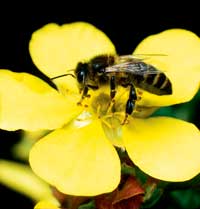£1m award to investigate bee decline

Scientists at Rothamsted Research and Warwick University have received £1 million from the Biotechnology and Biological Sciences Research Council and Syngenta to fund research into declining honeybee numbers.
According to UK government figures, bee numbers have fallen by 10-15% over the last two years and the British Beekeepers’ Association quotes a figure nearer 30% for 2008. Since the decline was first reported a number of factors have been suggested, but most scientists now believe a complex of interacting factors is the most likely cause.
Researchers will use a combination of field work and computer modelling to monitor how bees’ activity outside the hive interacts with behaviour inside the hive, factors which haven’t been compared in previous studies.
Bees living on agricultural landscapes have had a lot to deal with, said lead researcher Juliet Osborne. “They must respond to sudden changes in availability of food, pollen and nectar while dealing with a variety of diseases, parasites and other stresses,” she said. “This project will provide us with a unique insight into how disease and food supply affect the survival of bees in farmed landscapes.”
A predictive tool will be produced at the end of the study to help beekeepers, farmers and other landscape managers to improve honeybee health.
Professor Janet Allen, Director of Research, BBSRC said: “We are all concerned about the decline in honeybee numbers and the effect this could have on our food supplies. It is highly likely that there is no one cause of the drop in numbers which makes this project absolutely critical.”
In addition to this project, Syngenta have also launched Operation Pollinator, a five-year €1 million (£915,806) programme in seven European countries and the USA to boost pollinating insects by providing wildflower strips.
